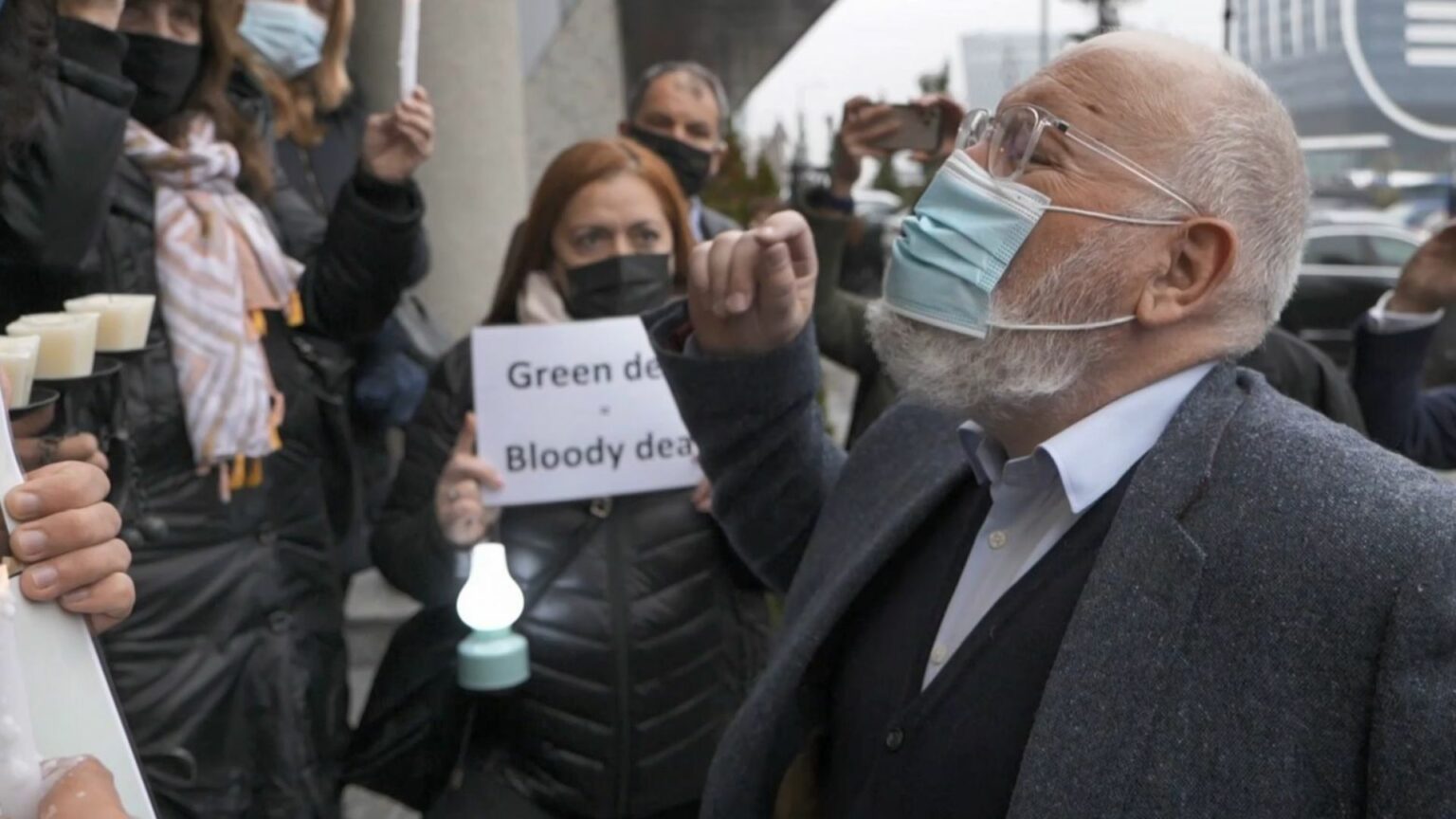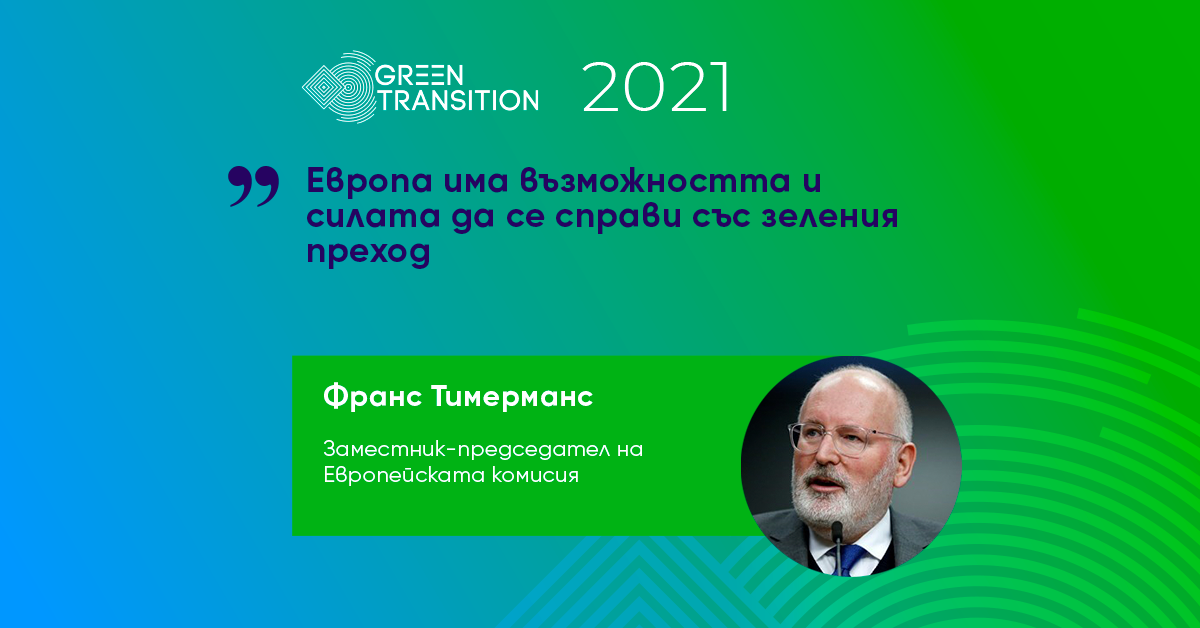Franciscus Cornelis Gerardus Maria Timmermans is a Dutch politician and diplomat. He has held the position of First Vice-President of the European Commission since 2014, and in the current Commission is the Executive Vice-President of the European Commission for the European Green Deal and is the European Commissioner for Climate Action since 2019. He was previously the First Vice-President of Jean-Claude Juncker and European Commissioner for Better Regulation, Interinstitutional Relations, the Rule of Law and the Charter of Fundamental Rights from 2014 to 2019.
Timmermans previously served in Dutch government bodies and was a member of the House of Representatives for the Labor Party (1998-2007; 2010-2012). He was also Deputy Secretary of State for European Affairs (2007-2010) and Minister of Foreign Affairs (2012-2014).
On October 15, Frans Timmermans visited Bulgaria for the international forum of Dir.bg and 3E-news “The Green Transition – Challenges and Solutions for Bulgaria”. During the conference, the Vice President of the EC spoke with the Acting Prime Minister, Stefan Yanev, who presented him with our Recovery Plan just one day after the document was adopted by the Council of Ministers.
Mr. Timmermans, will the energy crisis in Europe change the EU’s climate neutrality goals? You recently said that it will speed up the Green Transition” – what are your arguments?
I sure hope so, because it’s the only way we can be sure that we won’t be constantly affected by market movements. Now the prices are very high. By fulfilling the objectives of the Green Transition, Europe will reduce its dependence on natural gas prices. For this to happen, we need to have renewable energy that is cheap in the long run and can be quickly installed once the investment is made.
Will this be the preferred tool for solving not only climate but also energy and economic challenges?
If EU leaders draw the right conclusions from this energy crisis. And not for them to think “oh, we are in a crisis, let’s slow down the processes”. This would be the worst possible reaction to the current situation and it would be better to speed up these processes.
The green transition is not only policies, but also a way of thinking. Do you manage to find support among the EU citizens for the policies? What motivates you in this direction?
You know that most Europeans are worried about the climate crisis. They understand that we are existentially challenged by these changes. In Bulgaria, there is still a lot to be done on this issue, but most European citizens are extremely concerned, and because of this fact, this is a major topic in the EU. Even during the coronavirus crisis, the climate crisis remained at the top of the agenda for most people. But I understand that if you’re in a situation where you don’t know if you’ll make it to the end of the month, then the end of the world isn’t exactly your first concern. But when we analyze the challenges we all know about, we understand that we have to change the situation. And we need to change it in a fair and transparent way so that no one is left out.
And this is the way?
Yes, I think that’s the only way. And we have to prove to people that they will not be left alone.
How can this proof happen?
You know, politics is always about one main thing. Regardless of whether it is left, right or centrist. It’s about redistribution, that’s politics. We must be sure that society will develop in a fair way, that there are no gaps between its different groups, and that we will help people who cannot help themselves. And this is of enormous importance in times of huge transition, such as we are currently experiencing with the transition from carbon-intensive to climate-neutral fuels. The main problem is how to organize things in such a way as to prove to people that no one will be left behind. And how are we going to create new opportunities because there are 2 million new jobs expected in the green economy. But we also need to make sure that people get those jobs, and in the right regions.
What are your expectations from COP 21 in Glasgow, which starts at the end of the month? Can we think about a continuation of the Paris Agreement?
Since the Paris Agreement, we have had very disturbing reports from the International Committee on Climate Change. The latest analysis shows that we are very far from the target we should be following to prevent the catastrophe. And what we need to do now is to take measures that will allow us to fit within the framework of the Paris Agreement. And that is to stay well below the levels of temperature warming of 2 degrees Celsius, compared to pre-industrial levels. And so we have the opportunity to stay below 1.5 degrees. For this we have to radically change our economy.
What should happen in Glasgow? Countries should be more ambitious in reducing greenhouse gases, and developed countries should invest more funds in developing countries. So these countries will understand that solidarity is something that actually works.
Thirdly, we need to come to an agreement to define the “rules of the game” – that we all globally follow the same rules so that information can be compared. Then we will all be aware that we are moving in the right direction.
These are serious problems. Do you think you can come to an agreement?
First of all, I have become much more optimistic in the last few months. The reason for this is that more and more countries are taking more ambitious positions on the subject. This is a development in a good direction. Second, let’s be honest – we’re not going to be able to fill the gap entirely. We must strive to keep this gap as small as possible.
Both in terms of funding and ambition, we are looking ahead. And will it be enough? Let’s wait and see. If it is not enough, we will correct this after the Glasgow meeting. The important thing is to keep pushing because there is a positive momentum at the moment and to go that way.
“Let’s not turn our backs on anyone, but also control the process of the green transition”. Similar thought to yours, I read recently if I understood correctly. Does Europe have the strength to deal with such a challenge?
We have the capacity and the strength to handle it. But it has to start with the realization that if we do nothing, the problem will get much bigger. Because there is a fundamental misunderstanding among some people that if nothing is done, everything will remain as it is. It is not. The cost of doing nothing is significantly higher than that of action. And the cost of not doing so is reflected particularly strongly among the poor strata of our society, who suffer the most. People who have nowhere else to go.
So if you have a lot of wildfires, floods, or there is no crop produced, then if you are poor you have nowhere to go. If you’re rich there’s always room to move to.

It is the Green Deal that is of particular importance to people who are in more unenviable positions, not to the powerful people in society. That is why we must be sure that the Green Deal is also a social one. Let’s make sure that no one is left behind, and so we will distribute our efforts in such a way that people whose jobs will not exist in the future will gain new knowledge and skills. And they will be for sectors that will have them in the future.
This is also relevant for the demographic situation in Europe. No one wants to be unemployed in the future and that is why we must work to strengthen our economy.
This is the goal of the Just Transition Fund and the Social Climate Fund.
Exactly. We are mobilizing billions of euros so that member state governments can redistribute this funding to the people who will need it most. Thus, through the climate social fund, we will avoid energy poverty during the transition. And through the Just Transition Fund, we will help the 30 coal regions across the EU to overcome their coal dependence and create a new and strong economy. That’s exactly what we do.
What mechanisms does Europe have to counter the global energy crisis that is sweeping the world? Is it possible to calm energy prices, through market impact of the Emissions Trading Scheme or through tax policies for example?
Energy is a sector with great political influence. But energy is also heavily taxed everywhere. So some of the levies may be temporarily reduced, which will also lower people’s energy bills. There may also be compensation for people because of high bills. You can defer payments for a certain period of time. And other issues may be considered.
For example, the possibility to collectivize energy could be analyzed if this would work. We have different policy tools. But we must be aware that the current crisis is only temporary. It is not long-term because energy prices will go down again in the spring. It all depends on how severe the winter will be and how we get through it in the next few months.
And is it possible to influence it through the emissions trading scheme?
Let’s put it another way. The market price of natural gas is eight times more influential on the price of electricity than the emissions trading scheme. Because of this, the actual STE has little impact on electricity prices. And if we start considering options for changes in the emissions trading system, the result of this will also be insignificant. It is far better to look at the market situation in the energy markets.
Let me give you an example: In the last year, the price differences for a ton of emission allowances rose from 30 euros per ton to approximately 60 euros per ton. This resulted in an additional income for member states of almost €11 billion – that’s an additional income for one year – compared to a year earlier. These funds can be used to help people, to support them. This is why we have the emissions trading scheme. And governments need to show people what they are doing with their money. This is the citizens’ money and can be used for their welfare.
During the “Green Transition – Challenges and Solutions for Bulgaria” conference, you mentioned another source of electricity besides RES. I’m talking about nuclear power. Do you think this type of energy can help with the energy transition?
Nuclear power has huge advantages because there are no carbon emissions. But it also has several drawbacks – it is too expensive and it takes a long time before you get electricity from a nuclear power project. I don’t know of a single nuclear power plant project that was completed on time. Construction always takes longer and the price always doubles, even triples, regardless of where the construction takes place – whether we’re talking about Finland or France. So I have nothing against the development of nuclear energy, it has huge advantages because of its zero emissions. But be careful because it is very expensive and it can take a long time before you get electricity from a nuclear power plant.
